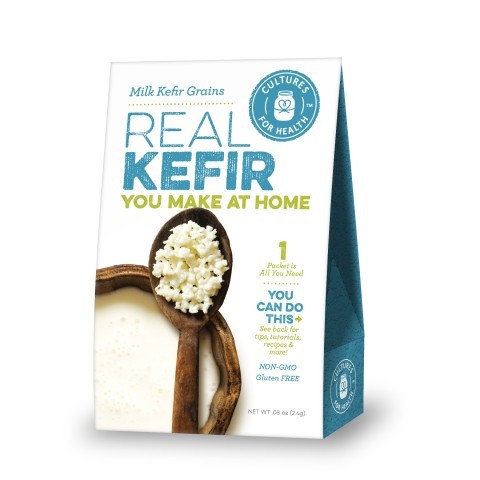Product Description
Cultures for Health Milk Kefir Grains

Adding milk kefir grains (MKG) to fresh milk yields a delicious probiotic drink in about 24 hours. Milk kefir can be enjoyed plain, flavored, or used in many recipes, from salad dressings to ice cream.
- Each box contains 1 packet of traditional, heirloom-style milk kefir grains.
- Rehydration period of 3-7 days with pasteurized (not raw) dairy milk is required before regular use.
- Cultures on the counter at 68°-85°F, no appliance required.
- Suitable for use with cow or goat milk. Nut and seed milks yield inconsistent results.
- Avoid using ultra-pasteurized or UHT milk.
- Reusable culture - makes up to 1 quart of kefir with every batch. MKG require regular refreshing in dairy milk.
- Instructions for using this culture are included and can be found here.
Milk Kefir Grains Allergen Information
- Manufactured in a facility that processes products containing soy and dairy.
- Non-GMO
- Gluten-free
Shipping and Storage Information
Our milk kefir grains are shipped in a dehydrated state in a barrier-sealed packet. The product keeps:
- At room temperature (68° to 78°F): 12 to 18 months
- In the refrigerator (40° to 45°F): 18+ months
- In the freezer (0° to 25°F): not recommended
Additional Details About Milk Kefir Grains (MKG)
Milk kefir grains are live active cultures consisting of yeast and bacteria existing in a symbiotic relationship. Milk kefir grains need to be rehydrated using pasteurized dairy milk (not raw milk) before regular use. Once milk kefir grains are rehydrated, they can be transitioned to raw milk. Milk kefir grains can be used to culture coconut, soy, or rice milk once rehydrated, but must be rehydrated in dairy milk first. Milk kefir grains require regular refreshing in fresh dairy milk (as soon as the texture changes.)
Actual product may differ from image shown above.
Milk Kefir Grains Ingredients:
Organic powdered milk, organic milk, live active cultures.
 |
Shipped to you by ground, anywhere in the continental US. For other locations, please contact us. |


I WANT TO MAKE SOME CULTURED FOODS, BUT DON’T KNOW HOW. CAN YOU HELP?
We believe the best place to start is with the correct starter. We offer starters specific to the type of foods you want to culture or ferment.
Each box of starter culture includes easy to follow directions. We also have some instructional videos on the product pages. Just scroll down on the Product Description until you see the video, or past the reviews section to the Product Videos link.

DO YOU HAVE ANY STARTERS THAT ARE DAIRY FREE?
Yes! Caldwell’s starter to ferment vegetables doesn’t contain any dairy. Other dairy free starters are the sourdough breads, water kefir grains, and the kombucha scoby. Please note that these starters may have been produced in a facility that also makes dairy starters.

SOME STARTERS USE THE TERM LACTO-FERMENT. ARE YOU SURE THERE ISN’T ANY DAIRY IN THE STARTER?
The word lacto comes from the name lactobacilli, which biologists have given to a broad family of friendly bacteria. Some of these bacteria are specific to milk, such as in yogurt and cheeses; others are specific to vegetables, and these do not contain dairy. They have one characteristic in common: they transform sugars into a beneficial form of lactic acid. During the fermentation process the friendly lactobacilli bacteria break down the sugars to produce a special form of lactic acid that acts as a natural preservative.

OTHER THAN A PLEASANT SOUR OR TART TASTE, WHY MAKE AND EAT FERMENTED FOODS?
It has been said that up to 85% of the body’s immune system is located in the gut. The entire surface of our digestive system is covered with bacteria. These microbes can be divided into 3 groups: beneficial, transitional and opportunistic flora. Maintaining a healthy colony of beneficial probiotic flora is absolutely essential to good health. Fermented foods help to provide this balance.
Making your own fermented foods is a fun and satisfying way to take charge of your health. You choose the ingredients; veggies from your yard or the farmer’s market, organic flour to make sourdough bread, pastured organic milk and cream for yogurt and milk kefir. Homemade fermented foods are not only good for health; they taste good too.

I’VE HAD MY STARTER IN A CUPBOARD FOR SEVERAL MONTHS. IS IT STILL GOOD?
Most likely it will be fine to use. Below is a general guide on how to store starters.
Kefir grains are dehydrated and can be kept in this state:
- At room temperature: 12 to 18 months
- In the refrigerator: 18+ months
- In the freezer: not recommended
- At room temperature: 3 to 4 months
- In the refrigerator: 6 to 9 months unopened
- In the freezer: 12 months unopened
- At room temperature: 12 months
- In the refrigerator: 12+ months
- In the freezer: 12+ months
- At room temperature: not recommended
- In the refrigerator: 6 months
- In the freezer: 12 months
Information provided in this communication is not designed to and does not provide medical advice, professional diagnosis, opinion, treatment or services to you or to any other individual. This is general information for educational purposes only. The information provided is not a substitute for medical or professional care, and you should not use the information in place of a visit, call consultation or the advice of your physician or other healthcare provider. Wise Choice Marketing Inc is not liable or responsible for any advice, course of treatment, diagnosis or any other information, services or product you obtain through Wise Choice Marketing Inc
Other Details
Product Videos
Check out our updated Milk Kefir Activation video here: https://youtu.be/9Qob--xV43Q Learn how to activate dehydrated Milk Kefir Grains. Step-by-step instructions for activating your kefir grains and getting them ready to make kefir.
-
![[OUTDATED] Milk Kefir Activation](//i.ytimg.com/vi/5RJljHbl3IA/default.jpg) [OUTDATED] Mil...Check out our updated Milk Kefir Activation video here: https:...
[OUTDATED] Mil...Check out our updated Milk Kefir Activation video here: https:... -
 How to Make Mi...Start making milk kefir here: https://shop.culturesforhealth.c...
How to Make Mi...Start making milk kefir here: https://shop.culturesforhealth.c... -
 How to Flavor ...Start making milk kefir here: https://shop.culturesforhealth.c...
How to Flavor ...Start making milk kefir here: https://shop.culturesforhealth.c...


 Loading... Please wait...
Loading... Please wait...











![[OUTDATED] Milk Kefir Activation](http://i.ytimg.com/vi/5RJljHbl3IA/default.jpg)


![[OUTDATED] Milk Kefir Activation](https://cdn2.bigcommerce.com/server2400/5c00a/templates/__custom/images/VideoOverlay.png?t=1610993401)








